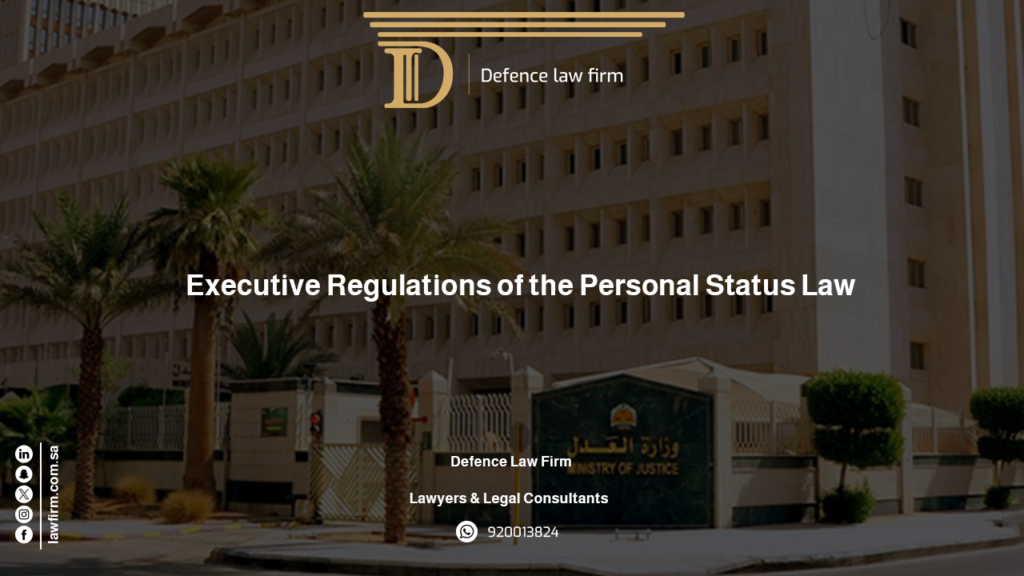The Executive Regulation of the Personal Status Law in the Kingdom of Saudi Arabia was issued as a comprehensive guide to regulate family matters. Clarifying the rights and obligations in cases of marriage, divorce, alimony, and custody. Also, other family-related issues. This regulation is a crucial step toward enhancing justice and protecting the rights of women and children. by Islamic Sharia law and societal developments. Through 41 articles, the regulation defines the legal procedures for marriage, organizes divorce and alimony procedures, with a focus on the family as a fundamental unit of society. In this article, we review the key aspects of the Executive Regulation of the Personal Status Law, its impact on society, and the role of legal experts at Defens Lawyers and Consultants in interpreting and applying it.
Table of Contents
Toggle1. The Executive Regulation of the Personal Status Law
The Executive Regulation of the Personal Status Law was issued to clarify all provisions. Also, procedures related to family law matters, including alimony, custody, marriage, and other family-related issues. The regulation aims to explain how the law’s provisions should be applied to ensure justice. It sets the rules and systems to protect the rights of individuals within society. The family is considered the cornerstone of society and the foundation of this structure.
The regulation was issued on the 17th of Sha’ban, 1446, and published on the 22nd of Sha’ban, 1446. It covers a variety of matters, including the registration of marriage for non-Muslims. The conditions for marriage under the age of 18, provisions related to dowries, alimony, housing, divorce, as well as custody and guardianship provisions.
2. The New Personal Status Law
Royal Decree issued the new Personal Status Law No. (M/73) on 6/8/1443, based on the decision of the Council of Ministers No. (429) dated 5/8/1443, and published in the official gazette on 15/8/1443. The new law was enacted to keep pace with the societal developments and changes within the legal and legislative framework.
One of the primary goals of the new law is to strengthen the protection of women’s and children’s rights. Providing clear solutions for issues such as divorce, custody, inheritance, and alimony. The law relies on the principles of Islamic Sharia as the main source of legislation in the Kingdom, aiming to regulate family affairs and ensure justice among its members.
3. Articles of the Executive Regulation of the Personal Status Law
The Executive Regulation of the Personal Status Law includes 41 articles, outlining provisions related to family affairs. These articles are designed to ensure justice and family stability within society, while also protecting rights, particularly those of women and children. This regulation reflects the judicial developments in the Kingdom.
The Executive Regulation, through its articles, clarifies the provisions of the law and ensures their practical application in line with Sharia principles. It addresses various aspects of family life, including marriage, the legal age for marriage, and divorce conditions. As well as procedures for organizing custody, alimony, inheritance, and guardianship. These provisions contribute to achieving family stability within the community.
4. Marriage and Divorce Procedures in the Executive Regulation
The Executive Regulation of the Personal Status Law in Saudi Arabia has clarified all the organizational procedures related to marriage and divorce. Aiming to protect rights and simplify procedures.
Regarding marriage, the regulation requires the consent of both parties for the marriage contract, and the contract must be officially documented. It also organizes marriage procedures, including dowry and alimony. Additionally, the regulation specifies the procedures and conditions for witnessing the contract, as stated in Article (27) of the regulation.
Regarding divorce, the regulation outlines all procedures for divorce, including the documentation of the divorce contract in court, notifying the wife. Also, setting the procedures for alimony and custody. According to Article (38) of the regulation, if the divorce occurs based on the provisions of Article (76) of the law, the Ministry of Justice, in coordination with relevant authorities. Will prepare forms and procedures for requesting alimony, marriage, and visitation. These requests can be submitted electronically, and a document will be issued for the request.
The regulation also sets conditions for granting permission for marriage to individuals under the age of 18, as outlined in Article 9 of the law. The requirements are as follows:
The marriage request must be submitted by the young man or woman wishing to marry, or by one of their parents.
The consent of the person wishing to marry must be pronounced in front of the court.
The person wishing to marry must be of sound physical and mental health, and there should be no harm in the marriage. This must be verified through a medical report, a psychological report, and a social report.
These marriage and divorce procedures aim to preserve the legal and Sharia rights of the spouses, organizing family relationships to maintain societal balance.

5. Alimony and Custody in the New Law
Alimony and custody are among the most significant issues addressed by the new Personal Status Law and its Executive Regulation in the Kingdom. As it seeks to achieve justice, especially after the divorce of the spouses, with amendments to strengthen children’s rights and ensure adequate care.
Alimony: Article (45) of the law defines alimony as a right of the dependent, including food, clothing, housing, and necessities according to custom. Is the husband’s obligation to his wife under the marriage contract, as stated in Article (46) of the law, depending on the dependent’s situation and the provider’s ability. Alimony may be in the form of money or goods, and it can be increased depending on changing circumstances.
Custody: According to Article (127) of the law, custody is a duty of both parents while the marriage remains intact. However, if a divorce occurs, custody is granted to the mother, and the order of precedence is as follows. Father, then the maternal grandmother, then the paternal grandmother, after which the court will decide what is in the child’s best interest.
If the child is under two years old and no one with the right to custody has claimed it, the mother must have custody. If the child reaches the age of two, the father must have custody if available; otherwise, the mother retains custody.
The law also specifies the reasons for the termination of custody, including:
If one of the conditions mentioned in Articles (125) and (126) of the law is not met.
The custodian moves to a place that would impede the child’s best interests.
If the custodian fails to claim custody for more than a year without a valid reason.
The system also regulates other custody-related matters, taking into account the child’s right to care.
6. The Role of Defense Lawyers and Consultants in Explaining the Executive Regulation of the Personal Status Law
Defens Lawyers and Consultants play a vital role in explaining and clarifying the Executive Regulation of the Personal Status Law.
Defens is one of the leading legal entities in the Kingdom of Saudi Arabia, and it plays a central role in providing comprehensive explanations of all Saudi regulations and laws. Especially the Executive Regulation of the Personal Status Law.
Through its distinguished legal team, the firm provides simplified explanations of the law’s articles. Also, clarifies their impact on family and society matters, such as marriage, divorce, custody, and alimony. It also offers reliable and precise legal consultations to clients to help them understand their rights and obligations in these matters.
7. Frequently Asked Questions:
1. What are personal status issues?
Personal status issues are all matters related to personal status, including. marriage validation, divorce, khula, annulment of marriage, custody, alimony, visitation, wills, parentage, inheritance, and division of estates. These issues are reviewed in personal status courts according to Islamic Sharia law and the applicable systems in the Kingdom.
2. What is past and future alimony?
Past Alimony: Refers to alimony claimed for a previous period in which the husband did not provide support. It is not considered a priority debt but is treated like an ordinary debt. Claims for past alimony cannot exceed two years from the date of filing the claim.
Future Alimony: Refers to alimony due from the date of the claim, continuing as long as the entitlement condition persists. It is considered a priority debt and takes precedence over other debts. The person who provided the alimony may claim reimbursement for amounts spent within one year from the date of the claim.
Conclusion:
The Executive Regulation of the Personal Status Law is a significant step towards enhancing family justice and protecting the rights of women and children in the Kingdom. If you need legal advice on the application of this regulation. Do not hesitate to contact the experts at Defens Lawyers and Consultants for accurate legal consultations tailored to your needs. Protect your rights today with one simple step!
For contact: 920013824 Or visit one of our branches:
📍Riyadh
📍Dammam
📍Qassim: Buraidah, Ali ibn Abi Talib Road, opposite King Abdullah Sports City.









